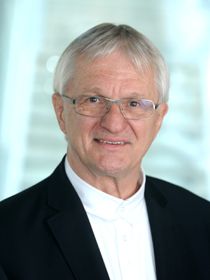
Prof. em. Dr. Roland W. Scholz
Gastprofessor - Department für Wissens- und Kommunikationsmanagement
-
roland.scholz@donau-uni.ac.at
-
+43 2732 893-5552
-
Zum Kontaktformular
-
Campus Krems, Trakt M, 2. Stock, 2.344
- Universität für Weiterbildung Krems
- Department für Wissens- und Kommunikationsmanagement
- Dr.-Karl-Dorrek-Straße 30
- 3500 Krems
- Österreich
Funktionen
Forschungs-/Themenschwerpunkte
- Transdisciplinarity
- Sustainable Digital Environments
- Sustainable Resources Management
- Coupled Human Environment Systems
Projekte (Auszug Forschungsdatenbank)
Abgeschlossene Projekte
Global Phosphate Data and Knowledge Hub
Projektzeitraum: 01.09.2022–31.10.2023
Projektverantwortung (Universität für Weiterbildung Krems): Gerald Steiner
Fördergeber: Sonstige
Projektzeitraum: 01.02.2017–31.07.2020
Projektverantwortung (Universität für Weiterbildung Krems): Lukas Zenk
Fördergeber: FFG
Förderprogramm: bridge
Forming a Responsible Use of Digital Data in Transdisciplinary Process
Projektzeitraum: 02.01.2019–31.07.2019
Projektverantwortung (Universität für Weiterbildung Krems): Roland W. Scholz
Fördergeber: Private (Stiftungen, Vereine etc.)
Rebound Effects of Digital Environments
Projektzeitraum: 20.03.2017–31.03.2019
Projektverantwortung (Universität für Weiterbildung Krems): Roland W. Scholz
Fördergeber: Bund (Ministerien)
European Roundtable Sustainable Digital Environments
Projektzeitraum: 12.09.2017–22.09.2017
Projektverantwortung (Universität für Weiterbildung Krems): Roland W. Scholz
Fördergeber: Bund (Ministerien)
Publikationen (Auszug Forschungsdatenbank)
Scholz, R.W.; Wellmer, F.-W.; Mew, M.; Steiner, G. (2025). The dynamics of increasing mineral resources and improving resource efficiency: Prospects for mid- and long-term security of phosphorus supply. Resources, Conservation and Recycling, Volume 213: 1 - 13
Scholz, R.W.; Wellmer, F.-W.; Mew, M.; Steiner, G. (2025). The Phosphorus Factbook: A Framework for Mid- and Long-Term Supply Security. Springer, Heidelberg
Goals and Structure (2025). Goals and Structure. In: Springer Nature Link, The Phosphorus Factbook: 1-10, Springer-Verlag GmbH, Berlin
Scholz R.W.; Wellmer F.W.; Mew M.;Steiner G. (2025). Future Research for Sustainable Phosphorus Supply and Recycling. In: Springer Nature Link, The Phosphorus Factbook: 255–280, Springer-Verlag GmbH, Berlin
Scholz R.W.; Wellmer F.W.;Mew M.; Steiner G. (2025). Demand Dynamics and the Cumulative Availability Curve. In: Springer Nature Link, The Phosphorus Factbook: 127-194, Springer-Verlag GmbH, Berlin
Scholz R.W.; Wellmer F.W.;Mew M.; Steiner G. (2025). Recycling Potentials as Source of Secondary Supply and Circular Economy. In: Springer Nature Link, The Phosphorus Factbook: 159-253, Springer-Verlag GmbH, Berlin
Scholz R.W.; Wellmer F.W.;Mew M.; Steiner G. (2025). Phosphorus Demand and Its Dynamics. In: Springer Nature Link, The Phosphorus Factbook: 11-126, Springer-Verlag GmbH, Berling
Lavrov, I.; Scholz, R.W.; Wellmer, F.-W. (2024). Lasky’s relationship applied to the western phosphate field / United States. Ore Geology Reviews, online: https://doi.org/10.1016/j.oregeorev.2024.106382
Scholz R.W.; Köckler H.; Zscheischler J.; Czichos R.; Hofmann K.-M.; Sindermann C. (2024). Transdisciplinary knowledge integration PART II: Experiences of five transdisciplinary processes on digital data use in Germany. Technological Forecasting and Social Change, 199: https://doi.org/10.1016/j.techfore.2023.122981
Scholz R.W.; Zschejschler J.; Köckler H.; Czichos R.; Hofmann K.M.; Sindermann C. (2024). Transdisciplinary knowledge integration – PART I: Theoretical foundations and an organizational structure. Technological Forecasting and Social Change, 202: 123281
Sindermann C.; Löchner N.; Heinzelmann R.; Montag C.; Scholz R.W. (2024). The revenue model of mainstream online social networks and potential alternatives: A scenario-based evaluation by German adolescents and adults. Technology in Scciety, 77: 12569
Bertau, M.; Wellmer, F.-W.; Scholz, R. W.; Mew, M.; Zenk, L.; Aubel, I.; Fröhlich, P.; Raddant, M.; Steiner, G. (2024). The Future of Phosphoric Acid Production – Why We Have to Leave Trodden Paths. ChemSusChem, Volume 17, Issue 22: https://doi.org/10.1002/cssc.202401155, Chemistry Europe
F.W. Wellmer; R.W. Scholz; D. Bastian (2023). Can ultimate recoverable resources (URRs) be assessed? Does analyzing declining ore grades help? Mineral Economics, 1: https://doi.org/10.1007/s13563-023-00368-0
Scholz R.W.; Renn O. (2023). Codes of Conduct for Collaboration as Social Rule Systems for Transdisciplinary Processes. Systemic Practice and Action Research, Issue 3; Vol 36: https://doi.org/10.1007/s11213-023-09641-3
Scholz R.W.; Steiner G. (2023). Process ownership in science–practice collaborations: the special role of transdisciplinary processes in sustainable transitioning. Sustainability Science, 18 Issue 1: 1-18
Sindermann C.; Scholz R.; Löchner N.; Heinzelmann R.; Montag C. (2023). The Revenue Model of Mainstream Social Media: Advancing Discussions on Social Media Based on a European Perspective Derived from Interviews with Scientific and Practical Experts. International Journal of Human-Computer Interaction, Vol 39, Issue 19: https://doi.org/10.1080/10447318.2023.2278292
Steiner, G.; Scholz, R.; Satalkina, L.; Schreder, G.; Zenk, L. (2023). Transdisciplinary Field Research Training: Vulnerability/resilience assessment of sensitive systems/cases. Broschüre für TISE Lehrprojekt
Scholz R.W.; Steiner G. (2022). The role of transdisciplinarity for mineral economics and mineral resource management: coping with fallacies related to phosphorus in science and practice. Mineral Economics, 35, Issue 2: https://doi.org/10.1007/s13563-022-00331-5
Wellmer F.W.; Scholz R.W. (2022). The interpretation of scarcity and the importance of resilience: An overlooked aspect of phosphorus supply security: A comment on Stamm et al. (2021). Ambio, 2: 1-3
Zscheischler J.; Brunsch R.; Rogga S.; Scholz R.W. (2022). Perceived risks and vulnerabilities of employing digitalization and digital data in agriculture – Socially robust orientations from a transdisciplinary process. Journal of Cleaner Production, 358: 132034
Vorträge (Auszug Forschungsdatenbank)
What is the added value of transdiscilinarity? Listen and participate in a discussion among authors of the Cambridge University Press "Phosphorus Sourcebook"
2nd Global Transdisciplinarity Conference, 28.06.2024
Resilient Phosphorus Supply and Sustainable Phosphorus Use
P-DaKH Transdisciplinarity Forum, 18.10.2023
UNVALIDATED MODELS OF PHOSPHORUS SCARCITY: KEEPING THE INTEGRITY OF SCIENCE BIASES AND FALLACIES RELATED TO PHOSPHORUS
6th Conference on Innovations in Nutrition and Food Science (INFS-2022), 06.10.2022
Reflexion auf die ETH–Fallstudie und Rückblick auf den Biotopverbund
Rückschau – Ausblick auf 25 Jahre Grosses Moos Eine Reflexion auf eine ETH – Studie aus dem Jahre 1994 über die Entwicklung im Grossen Moos, 20.09.2022
Laudatio Deutscher Nachhaltigkeitspreis 2017 Dr. Laura Woltersdorf
Wuppertal Institut, Wuppertal/Berlin, 05.12.2017
Transdisciplinaritäts Workshop (Lehrveranstaltung)
Donau-Universität Krems , 15.11.2017
From visual perception to sustainable transitions: Contributions of Brunswik’s theory of probabilistic functionalism
25th International Meeting of the Brunswik Society, Vancouver, 09.11.2017
Goals of the European ERT Structuring Research for Sustaiable Digital Environments
European ERT Structuring Research for Sustaiable Digital Environments; BMBF Bonn, 19.09.2017
Methods and Principles of Transdisciplinarity (Lehrveranstaltung)
Donau-Universität Krems, Summer School, 17.07.2017
Some proposals on sustainable management
UNEP-GPNM Meeting, Den Haag, 25.04.2017
Methods for Classifying Digital Threats (Lehrveranstaltung)
Donau-Universität Krems, 23.02.2017
Unintended Side Effects resulting from biotechnological and psychosomatic reboun effects of the new digital environment
Alternate Policy Process Institute, University of Tokyo, 21.02.2017